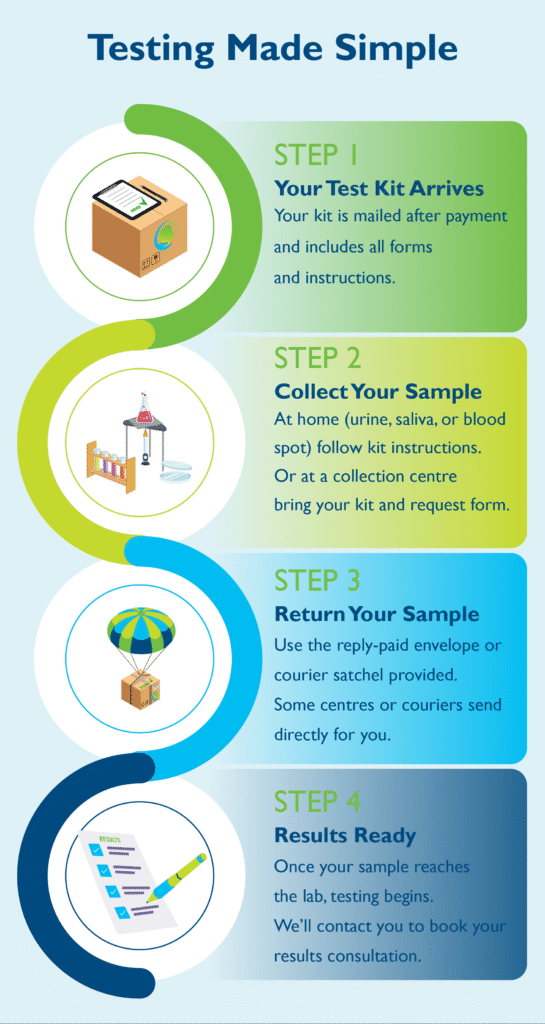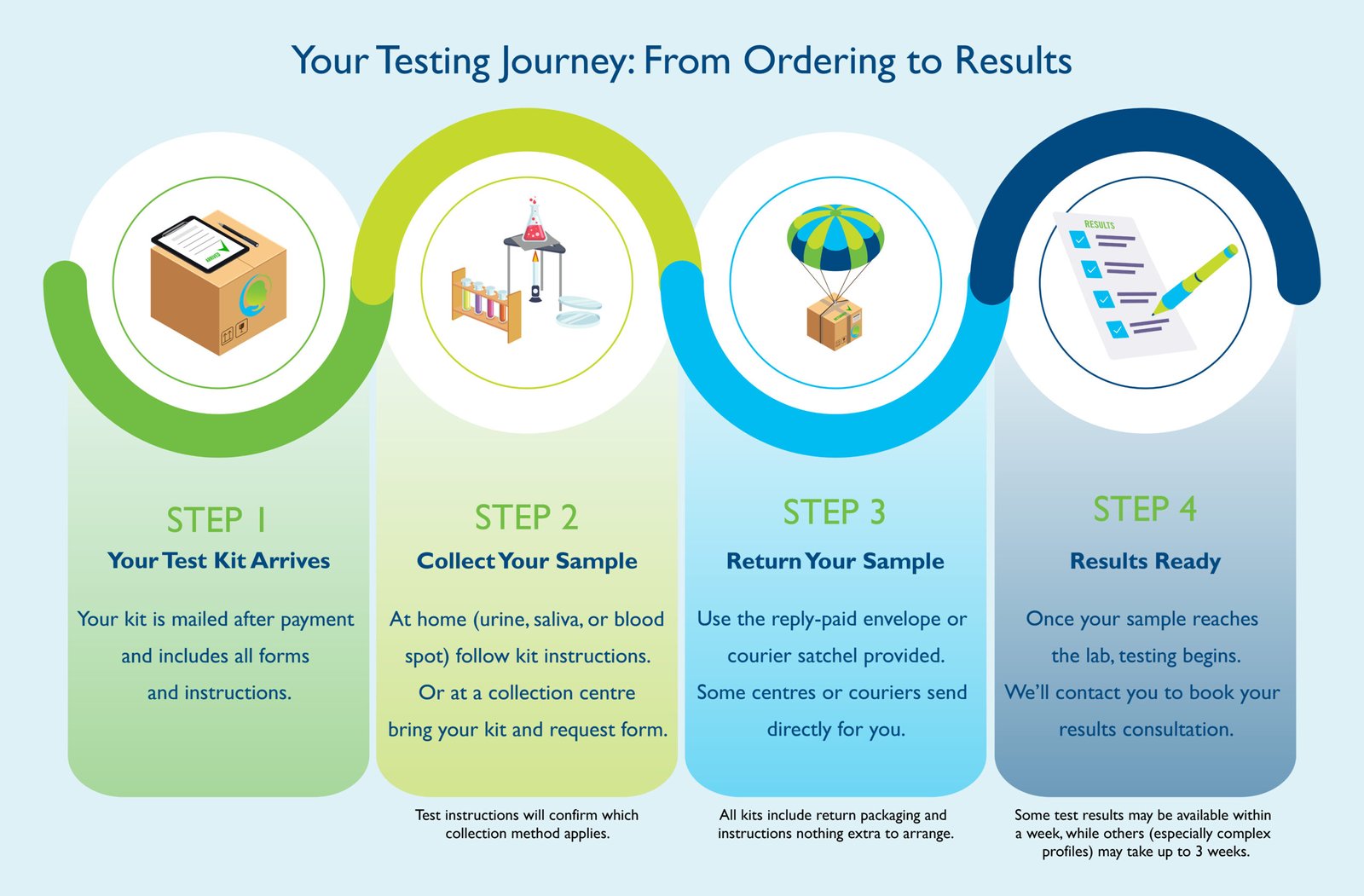MTHFR Testing: Genetic Insight Into Your Methylation Pathway
MTHFR testing reveals whether you carry genetic variants that affect methylation—a critical biochemical process for mental health, detoxification, cardiovascular function, and more. This DNA-based test helps identify your capacity to activate folate, make neurotransmitters, and regulate homocysteine.
If you’ve struggled with anxiety, depression, hormonal imbalances, or chronic fatigue, knowing your MTHFR status can unlock personalized treatment strategies to support methylation efficiency and brain chemistry balance.
Not sure where this fits? See our Pathology Testing Packages & Pathways to choose your starting point → /pathology-testing-packages.

MTHFR stands for methylenetetrahydrofolate reductase, an enzyme that activates folate into 5-MTHF (methylfolate)—the form your body needs to fuel methylation.
Two common SNPs (genetic variants) are tested:
- C677T
- A1298C
These variants can result in:
- 🧬Up to 70% loss of enzyme activity
- ⬆️Elevated homocysteine (risk factor for mood issues, vascular problems)
- ⚠️Impaired neurotransmitter synthesis, detoxification, and DNA repair
- 🚫Poor tolerance of synthetic folic acid in multivitamins or fortified foods
This is a one-time saliva or blood test—once you know your genetics, you can tailor your nutrition and supplementation for life
Methylation is a foundational process for mental health, influencing how the body produces neurotransmitters, detoxifies harmful substances, and regulates homocysteine. When MTHFR function is compromised, these critical pathways can silently become disrupted, contributing to symptoms such as:
- Serotonin, dopamine, and norepinephrine synthesis—affecting mood, motivation, and anxiety regulation.
- Detoxification pathways, allowing heavy metals and environmental toxins to accumulate, contributing to oxidative stress and cognitive decline.
- Homocysteine regulation, which, when elevated, is a known factor in depression, anxiety, and cognitive impairment.
While MTHFR testing is not a “magic bullet,” it provides critical insight into how well your body can activate and utilize folate, informing decisions on:
- Whether methylfolate supplementationis needed.
- How to balance supporting nutrients like B12, B6, zinc, and magnesium.
- Identifying individuals who may poorly tolerate synthetic folic acid, commonly hidden in supplements and processed foods.
In functional psychiatry, MTHFR testing isn’t about genetic determinism—it’s about understanding your biochemical starting point and crafting interventions that work with, not against, your genetic profile.


Your Testing Journey: From Ordering to Results

STEP 1

STEP 2

STEP 3

STEP 4
Gene | SNP | Result Possibilities |
MTHFR | C677T | Normal / Heterozygous / Homozygous |
MTHFR | A1298C | Normal / Heterozygous / Homozygous |
🧠 These two SNPs affect folate metabolism and methylation efficiency.
📎 Optional Add-Ons (from labs like SmartDNA or NutriPath):
- COMT, CBS, MTR, MTRR, BHMTgenes for deeper methylation pathway insight
Plasma methylation markers: SAM, SAH, Homocysteine, Methionine (from Doctor’s Data)
Saliva Option:
- Sterile buccal swabs (x2)
- Collection instructions
- Barcode labels & consent form
- Return envelope
Blood Option:
- Requisition form
- Blood tube(s)
- Courier label (overnight return)
Option 1️⃣: 🧬 Saliva (Buccal Swab Collection)
1️⃣ Prepare the Kit & Area
- 🧼Wash your hands thoroughly.
- 🚫Ensure you have not eaten, drunk (except water), or brushed your teeth for at least 30 minutes prior to collection.
2️⃣ Collecting the Sample
- 📦Open the sterile swab without touching the cotton tip.
- 🧬Rub the swab firmly against the inside of your cheek for 30–60 seconds, ensuring thorough contact.
- 🔄Repeat with the second swab on the opposite cheek.
3️⃣ Packing the Sample
- 🗂️Place both swabs into the provided container or pouch.
- 📝Complete the consent form and label the sample with your full name, date of birth, and collection date.
4️⃣ ✉️ Mailing the Sample
- Place the sample and completed requisition form into the prepaid return envelope.
- 📮Post the sample back to the lab within 24 hours of collection.
Option 2️⃣: 🩸 Blood (Venous Collection at Pathology Centre)
Option 2️⃣: 🩸 Blood (Venous Collection at Pathology Centre)
1️⃣ Prepare Your Pathology Appointment
- 📅Book a venous blood draw at your local pathology collection centre.
- 📝Bring your requisition form provided in the kit.
2️⃣ Collection at Pathology
- A trained phlebotomist will collect a small blood sample, typically into EDTA tubes.
- 🩸The collection is quick and generally comfortable.
3️⃣ ✉️ Packing & Return
- 🗂️Ensure the collection centre completes all labelling and documentation.
- 📦Samples are shipped to the lab via overnight courier as per kit instructions.
💡 Important Collection Facts:
- 🧬DNA tests are done once in a lifetime—no need to retest these SNPs.
- 🩺Both saliva and blood methods yield accurate MTHFR genotyping results.
- 🚫Avoid contaminating swabs with food, drink, or saliva from brushing teeth within 30 minutes prior.
- 🩸Blood collection is recommended if you’re combining this test with other panels (e.g., Homocysteine, Folate).
⚠️ Common Mistakes to Avoid:
- ❌Touching the cotton tip of the swab before collection — contaminates the sample.
- ❌Eating, drinking, or brushing teeth within 30 minutes of saliva collection.
- ❌Not completing or signing the requisition and consent forms.
- ❌Delaying postage — samples should be returned within 24 hours of collection.
💡 “Your genes aren’t your destiny—but knowing your MTHFR status can help you reclaim your health.”
Book your Appointment
15-MINUTE FREE DISCOVERY CALL Confused about testing? Talk to me first.
I’m the practitioner behind BalanSoul. In 15 minutes we’ll map your best next step what to test (and what not to), likely costs/timing, and how it links to your mental health goals.







